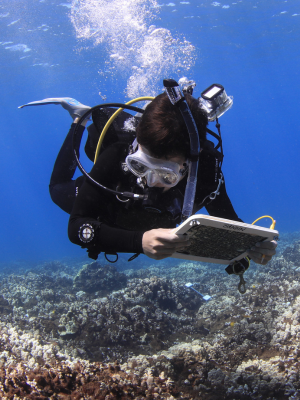Meet Orion McCarthy

Tell us a bit about your background: I grew up in Maryland just outside of Washington DC. I’ve had a passion for marine life and conservation since I was young, and over time these interests drew me toward research on coral reef ecology and conservation efficacy. I completed my undergraduate education at the University of Maryland (BS in Ecology and Evolution) and spent a semester abroad at James Cook University in Australia. Before coming to Scripps, I completed research-based internships at the International Pacific Halibut Commission and the World Wildlife Fund, and completed a 2-year ocean policy fellowship at the Meridian Institute. I joined Dr. Jen Smith's lab at Scripps in 2018, with funding from the NSF Graduate Research Fellowship Program. While completing my PhD, I managed the Smith Lab's Maui Nui coral reef monitoring program, traveled to the international climate COP in Egypt, participated in field work in Hawaii, Palmyra Atoll, and the Federated States of Micronesia.
What are you studying/researching? I was in Dr. Jen Smith's lab at Scripps and also worked closely with Dr. Stuart Sandin's lab and the 100 Island Challenge team. I spent my PhD tracking coral reef change over time in response to global climate change and local human impacts, focusing specifically on the Maui Nui region of Hawaii. To do this, our team would take thousands of underwater pictures via SCUBA, and then stitch those pictures together into a 3D model using a technology called “large area imaging”. These 3D models made it possible to do "virtual fieldwork" back in the lab, which allowed me to explore cool new research questions that wouldn’t have been practical to answer before. We revisited sites year after year and use the resulting 3D models to visualize change over time, from coral growth to the impact of disturbance events. Specifically, my thesis 1) identified trends in coral reef structural complexity in Hawaii, 2) described patterns of reef succession and recovery in Maui Nui, 3) assessed the role of acclimatization and selection in changing coral bleaching responses over time, and 4) evaluated the predictive accuracy of coral reef resilience assessments. My research also focused on identifying barriers that conservation practitioners face to using large area imagery so that the technology can hopefully become more accessible in the future.
Tell us about your professional experience and campus involvement at UC San Diego:
Scripps has such an amazing and close-knit community that truly shaped my time at UC San Diego. I enjoyed learning from senior grad students and mentoring those that came up behind me, including through TAing and mentoring volunteer undergrad researchers and junior lab members. I also served as a co-chair of Queer@Scripps, a student group that aims to create a safe space for other LGBTQIA+ scientists at SIO, which helped me and many other students realize that they are not alone in academia. I also really enjoyed being a volunteer diver at Birch Aquarium, and I miss feeding the giant black seabass and interacting with aquarium guests as SCUBA Santa! Outside of graduate student life, I spent a lot of time with a close group of Scripps friends (the Hubbs Homies!) hanging at the beach, cooking and going out to eat, playing board games, hiking, making pottery, and exploring Southern California.
I currently collaborate with members of the Smith and Sandin Labs on some active research projects, including supporting field work and planning for the future of the Smith Lab's Maui Nui coral reef monitoring program. I hope this close collaboration can continue into the future - while I was very ready to be done with graduate school, I'm not ready to move on from the Scripps community! Such great people, and so much cool research to do!
Why UC San Diego? Aside from the world-class research conducted at Scripps, and the beautiful weather in San Diego, I was drawn to the community of students and faculty at SIO. I was very impressed with the friendly, social, and hard-working spirit of the SIO community during the Open House, and that is really what pushed me to come here. I continue to be impressed, especially by my fellow graduate students, every single day.
Have you been awarded any fellowships or grants during graduate school? If so, which ones? I was awarded the NSF GRFP the year I applied to SIO. This provided me with the freedom to design my own research project, and I am incredibly thankful for receiving this funding.
What has been your favorite part about your graduate experience at UC San Diego? So far, the highlight of my time at SIO has been the friends and personal connections that I've made here. Being surrounded by other people who care as much as I do about the ocean and science is a new experience for me, and it is enriching both professionally and socially. And of course, being able to regularly dive and conduct field work hasn't been bad, either!